2007年 专八翻译汉译英
- 格式:ppt
- 大小:1.43 MB
- 文档页数:13
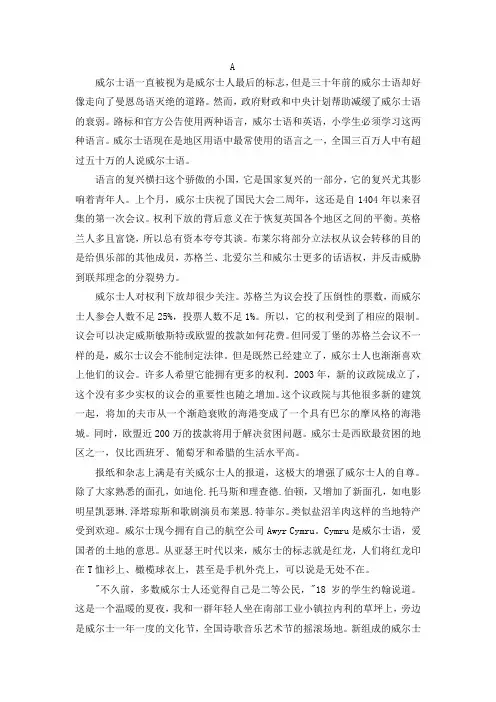
A威尔士语一直被视为是威尔士人最后的标志,但是三十年前的威尔士语却好像走向了曼恩岛语灭绝的道路。
然而,政府财政和中央计划帮助减缓了威尔士语的衰弱。
路标和官方公告使用两种语言,威尔士语和英语,小学生必须学习这两种语言。
威尔士语现在是地区用语中最常使用的语言之一,全国三百万人中有超过五十万的人说威尔士语。
语言的复兴横扫这个骄傲的小国,它是国家复兴的一部分,它的复兴尤其影响着青年人。
上个月,威尔士庆祝了国民大会二周年,这还是自1404年以来召集的第一次会议。
权利下放的背后意义在于恢复英国各个地区之间的平衡。
英格兰人多且富饶,所以总有资本夸夸其谈。
布莱尔将部分立法权从议会转移的目的是给俱乐部的其他成员,苏格兰、北爱尔兰和威尔士更多的话语权,并反击威胁到联邦理念的分裂势力。
威尔士人对权利下放却很少关注。
苏格兰为议会投了压倒性的票数,而威尔士人参会人数不足25%,投票人数不足1%。
所以,它的权利受到了相应的限制。
议会可以决定威斯敏斯特或欧盟的拨款如何花费。
但同爱丁堡的苏格兰会议不一样的是,威尔士议会不能制定法律。
但是既然已经建立了,威尔士人也渐渐喜欢上他们的议会。
许多人希望它能拥有更多的权利。
2003年,新的议政院成立了,这个没有多少实权的议会的重要性也随之增加。
这个议政院与其他很多新的建筑一起,将加的夫市从一个渐趋衰败的海港变成了一个具有巴尔的摩风格的海港城。
同时,欧盟近200万的拨款将用于解决贫困问题。
威尔士是西欧最贫困的地区之一,仅比西班牙、葡萄牙和希腊的生活水平高。
报纸和杂志上满是有关威尔士人的报道,这极大的增强了威尔士人的自尊。
除了大家熟悉的面孔,如迪伦.托马斯和理查德.伯顿,又增加了新面孔,如电影明星凯瑟琳.泽塔琼斯和歌剧演员布莱恩.特菲尔。
类似盐沼羊肉这样的当地特产受到欢迎。
威尔士现今拥有自己的航空公司Awyr Cymru。
Cymru是威尔士语,爱国者的土地的意思。
从亚瑟王时代以来,威尔士的标志就是红龙,人们将红龙印在T恤衫上、橄榄球衣上,甚至是手机外壳上,可以说是无处不在。
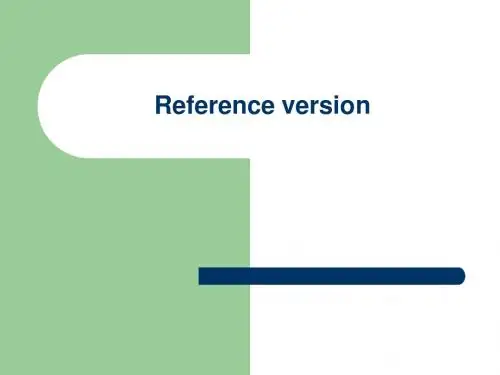
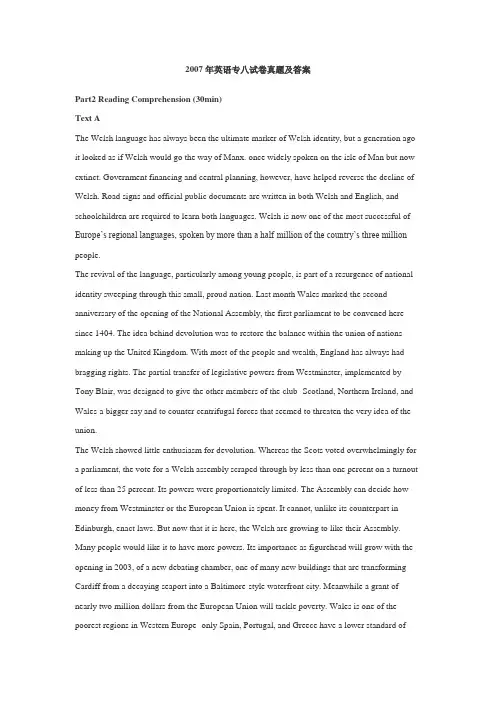
2007年英语专八试卷真题及答案Part2 Reading Comprehension (30min)Text AThe Welsh language has always been the ultimate marker of Welsh identity, but a generation ago it looked as if Welsh would go the way of Manx. once widely spoken on the isle of Man but now extinct. Government financing and central planning, however, have helped reverse the decline of Welsh. Road signs and official public documents are written in both Welsh and English, and schoolchildren are required to learn both languages. Welsh is now one of the most successful of Europe’s regional languages, spoken by more than a half-million of the country’s three million people.The revival of the language, particularly among young people, is part of a resurgence of national identity sweeping through this small, proud nation. Last month Wales marked the second anniversary of the opening of the National Assembly, the first parliament to be convened here since 1404. The idea behind devolution was to restore the balance within the union of nations making up the United Kingdom. With most of the people and wealth, England has always had bragging rights. The partial transfer of legislative powers from Westminster, implemented by Tony Blair, was designed to give the other members of the club- Scotland, Northern Ireland, and Wales-a bigger say and to counter centrifugal forces that seemed to threaten the very idea of the union.The Welsh showed little enthusiasm for devolution. Whereas the Scots voted overwhelmingly for a parliament, the vote for a Welsh assembly scraped through by less than one percent on a turnout of less than 25 percent. Its powers were proportionately limited. The Assembly can decide how money from Westminster or the European Union is spent. It cannot, unlike its counterpart in Edinburgh, enact laws. But now that it is here, the Welsh are growing to like their Assembly. Many people would like it to have more powers. Its importance as figurehead will grow with the opening in 2003, of a new debating chamber, one of many new buildings that are transforming Cardiff from a decaying seaport into a Baltimore-style waterfront city. Meanwhile a grant of nearly two million dollars from the European Union will tackle poverty. Wales is one of the poorest regions in Western Europe- only Spain, Portugal, and Greece have a lower standard ofliving.Newspapers and magazines are filled with stories about great Welsh men and women, boosting self-esteem. To familiar faces such as Dylan Thomas and Richard Burton have been added new icons such as Catherine Zeta-Jones, the movie star, and Bryn Terfel, the opera singer. Indigenous foods like salt marsh lamb are in vogue. And Wales now boasts a national airline. Awyr Cymru. Cymru, which means “land of compatriots,” is the Welsh name for Wales. The red dragon, the nation’s symb ol since the time of King Arthur, is everywhere- on T-shirts, rugby jerseys and even cell phone covers.“Until very recent times most Welsh people had this feeling of being second-class citizens,” said Dyfan Jones, an 18-year-old student. It was a warm summer night, and I was sitting on the grass with a group of young people in Llanelli, an industrial town in the south, outside the rock music venue of the National Eisteddfod, Wales’s annual cultural festival. The disused factory in front of us echoed to the sounds of new Welsh bands.“There was almost a genetic tendency for lack of confidence,” Dyfan continued. Equally comfortable in his Welshness as in his membership in the English-speaking, global youth culture and the new federal Europe, Dyfan, like the rest of his generation, is growing up with a sense of possibility unimaginable ten years ago. “We used to think. We can’t do anything, we’re only Welsh. Now I think that’s changing.”11. According to the passage, devolution was mainly meant toA. maintain the present status among the nations.B. reduce legislative powers of England.C. create a better state of equality among the nations. √D. grant more say to all the nations in the union.12. The word “centrifugal” in the second paragraph meansA. separat ist.√B. Conventional.C. feudal.D. political13. Wales is different from Scotland in all the following aspects EXCEPTA. people’s desire for devolution.B. locals’ turnout for the voting.C. powers of the legislative body.D. status of the national language.√14. Which of the following is NOT cited as an example of the resurgence of Welsh national identityA. Welsh has witnessed a revival as a national language.B. Poverty-relief funds have come from the European Union.√C. A Welsh national airline is currently in operation.D. The national symbol has become a familiar sight.15. According to Dyfan Jones what has changed isA. people’s mentality. √B. pop culture.C. town’s appearance.D. possibilities for the people.Text BGetting to the heart of Kuwaiti democracy seems hilariously easy. Armed only with a dog-eared NEWSWEEK ID, I ambled through the gates of the National Assembly last week. Unscanned, unsearched, my satchel could easily have held the odd grenade or an anthrax-stuffed lunchbox. The only person who stopped me was a guard who grinned and invited me to take a swig of orange juice from his plastic bottle.Were I a Kuwaiti woman wielding a ballot, I would have been a clearer and more present danger. That very day Parliament blocked a bill giving women the vote; 29 M.P.s voted in favour and 29 against, with two abstentions. Unable to decide whether the bill had passed or not, the government scheduled another vote in two weeks- too late for women to register for June’s municipal elections. The next s uch elections aren’t until 2009. Inside the elegant, marbled Parliament itself, a sea of mustachioed men in white robes sat in green seats, debating furiously. The ruling emir has pushed for women’s political rights for years. Ironically, the democraticall y elected legislature has thwarted him. Traditionalists and tribal leaders are opposed. Liberals fret, too, that Islamists will let their multiple wives vote, swelling conservative ranks. “When I came to Parliament today, people who voted yes didn’t even shake hands with me,” said one Shia clerc. “Why can’t we respect each other and work together?”Why not indeed? By Gulf standards, Kuwait is a democratic superstar. Its citizens enjoy free speech (as long as they don’t insult their emir, naturally) and boas t a Parliament that can actually pass laws. Unlike their Saudi sisters, Kuwaiti women drive, work and travel freely. They run multibillion-dollar businesses and serve as ambassadors. Their academic success is such that colleges have actually lowered the grades required for make students to get into medical andengineering courses. Even then, 70 percent of university students are females.In Kuwait, the Western obsession with the higab finds its equivalent. At a fancy party for NEWSWEEK’s Arabic edition, som e Kuwaiti women wore them. Others opted for tight, spangled, sheer little numbers in peacock blue or parrot orange. For the party’s entertainment, Nancy Ajram, the Arab world’s answer to Britney Spears, sang passionate songs of love in a white mini-dress. She couldn’t dance for us, alas, since shaking one’s body onstage is illegal in Kuwait. That didn’t stop whole tables of men from raising their camera-enabled mobile phones and clicking her picture. You’d think not being able to vote or dance in public would anger Kuwait’s younger generation of women. To find out, I headed to the malls-Kuwait’s archipelago of civic freedom. Eager to duckStrict parents and the social taboos of dating in public. young Kuwaitis have taken to cafes, beaming flirtatious infrared e-mails to one another on their cell photos. At Starbucks in the glittering Al Sharq Mall, I found only tables of men, puffing cigarettes and grumbling about the service .At Pizza Hut, I thought I’d got an answer after encountering a young woman who loo ked every inch the modern suffragette—drainpipe jeans,strappy sliver high-heeled sandals and a higab studded with purple rhinestones. But, no, Miriam Al-Enizi, 20,studying business administration at Kuwait University, doesn’t think women need the vote.” Me n are better at politics than women,”she explained, adding that women in Kuwait already have everything they need. Welcome to democracy, Kuwait style.16. According to the passage, which of the following groups of people might be viewed as being dangerous by the guards?A. Foreign tourists.B. Women protestors.√C. Foreign journalists.D. Members of the National Assembly.17. The bill giving women the vote did not manage to pass becauseA. Different interest groups held different concerns.√B.Liberals did not reach consensus among themselves.C. Parliament was controlled by traditionalists.D.Parliament members were all conservatives.18. What is the role of the 4th and 5th paragraphs in the development of the topic?A. To show how Kuwaiti women enjoy themselves.B. To describe how women work and study in Kuwait.C. To provide a contrast to the preceding paragraphs.√D. To provide a contrast to the preceding paragraphs.19. Which of the following is NOT true about young Kuwaiti women?A. They seem to be quite contented.B. They go in for Western fashions.C. They desire more than modern necessities.√D. They favour the use of hi-tech products.Text CRichard, King of England from 1189 to 1199, with all his characteristic virtues and faults cast in a heroic mould, is one of the most fascinating medieval figures. He has been described as the creatureand embodiment of the age of chivalry, In those days the lion was much admired in heraldry, and more than one king sought to link himself with its repute. When Richard's contemporaries called him" Coeur de Lion"(The Lion heart), they paid a lasting compliment to the king of beasts. Little did the English people owe him for his services, and heavily did they pay for his adventures. He was in England only twice for a few short months in his ten years' reign; yet his memory has always English hearts, and seems to present throughout the centuries the pattern of the fighting man. In all deeds of prowess as well as in large schemes of war Richard shone. He was tall and delicately shaped strong in nerve and sinew, and most dexterous in arms. He reioiced in personal combat, and regarded his opponents without malice as necessary agents in his fame He loved war, not so much for the sake of glory or political ends, but as other men love science or poetry, for the excitement of the struggle and the glow of victory. By this his whole temperament was toned; and united with the highest qualities of the military commander, love of war called forth all the powers of his mind and body.Although a man of blood and violence, Richard was too impetuous to be either treacherous on habitually cruel. He was as ready to forgive as he was hasty to offend; he was open-handed and munificent to profusion; in war circumspect in design and skilful in execution; in political a child, lacking in subtlety and experience. His political alliances were formed upon his likes and dislikes; his political schemes had neither unity nor clearness of purpose. The advantages gained for him by military geoids were flung away through diplomatic ineptitude. When, on the jouthey to the East,Messina in Sicily was won by his arms he was easily persuaded to share with his polished, faithless ally, Philip Augustus, fruits of a victory which more wisely used might have foiled the French King's artful schemes. The rich and tenable acquisition of Cyprus was cast away even more easily than it was won. His life was one magnificent parade, which, when ended, left only an empty plain.In 1199, when the difficulties of raising revenue for the endless war were at their height, good news was brought to King Richard. It was said there had been dug up near the castle of Chaluz, on the lands of one of his French vassals, a treasure of wonderful quality; a group of golden images of an emperor, his wife, sons and daughters, seated round a table, also of gold, had been unearthed. The King claimed this treasure as lord paramount. The lord of Chaluz resisted the demand, and the King laid siege to his small, weak castle. On the third day, as he rode daringly, near the wall. confident in his hard-tried luck, a bolt from a crossbow struck him in the left shoulder by the neck. The wound, already deep, was aggravated by the necessary cutting out of the arrow-head. Gangrene set in, and Coeur de Lion knew that he must pay a soldier’s debt. He prepared for death with fortitude and calm, and in accordance with the principles he had followed. He arranged his affairs, he divided his personal belongings among his friends or bequeathed them to charity. He declared John to be his heir, and made all present swear fealty to him. He ordered the archer who had shot the fatal bolt, and who was now a prisoner, to be brought before him. He pardoned him, and made him a gift of money. For seven years he had not confessed for fear of being compelled to be reconiled to Philip, but now he received the offices of the Church with sincere and exemplary piety, and died in the forty-second year of his age on April 6, 1199, worthy, by the consent of all men, to sit with King Arthur and Roland andother heroes of martial romance at some Eternal round Table, which we trust the Creator of the Universe in His comprehension will not have forgotten to provide.The archer was flayed alive.20 “ little did the English people own him for his service” (paragraph one) means that the EnglishA. paid few taxes to him.B. gave him little respect.C. received little protection from him.D. had no real cause to feel grateful to him.√21. To say that his wife was a “ magnificent parade’( paragraph Tw o) implies that it was to some extent.A . spent chiefly at war. B. impressive and admirable.C. lived too pompouslyD. an empty show.√22. Richard’s behaviour as death approached showed.\A. bravery and self-control.B. Wisdom and correctnessC. Devotion a nd romanceD. Chivalry and charity√23. The point of the last short paragraph is that Richard wasA. cheated by his own successorsB. determined to take revenge on his enemies.C. more generous to his enemies than his seccesors.D unable to influence the be havior of his successors.√24. Which of the following phrase best describes Richard as seen by the author?A. An aggressive king, too fond of war.B. A brave king with minor faults.√C. A competent but cunning soldier.D. A kind with great political skills.25. The relationship between the first and second paragraphs is thatA. each presents one side of the picture. √B. the first generalizes the second gives examples.C. the second is the logical result of the first.D. both present Richard’s virtues and fault s.TEXT DThe miserable fate of Enron’s employees will be a landmark in business history, one of those awful events that everyone agrees must never be allowed to happen again. This urge is understandable and noble: thousands have lost virtually all their retirement savings with the demise of Enron stock. But making sure it never happens again may not be possible, because the sudden impoverishment of those Enron workers represents something even larger than it seems. It’s the latest turn in the unwinding of one of the most audacious promise of the 20th century.The promise was assured economic security-even comfort- for essentially everyone in the developed world. With the explosion of wealth, that began in the 19th century it became possible to think about a possibility no one had dared to dream before. The fear at the center of daily living since caveman days- lack of food warmth, shelter- would at last lose its power to terrify. That remarkable promise became reality in many ways. Governments created welfare systems for anyone in need and separate programmes for the elderly (Social Security in the U.S.). Labour unions promised not only better pay for workers but also pensions for retirees. Giant corporations came into being and offered the possibility- in some cases the promise- of lifetime employmentplus guaranteed pensions.? The cumulative effect was a fundamental change in how millions of people approached life itself, a reversal of attitude that most rank as one of the largest in human history. For mi llennia the average person’s stance toward providing for himself had been. Ultimately I’m on my own. Now it became, Ultimately I’ll be taken care of.The early hints that this promise might be broken on a large scale came in the 1980s. U.S. business had become uncompetitive globally and began restructuring massively, with huge Layoffs. The trend accelerated in the 1990s as the bastions of corporate welfare faced reality. IBM ended it’s no-layoff policy. AT&T fired thousands, many of whom found such a thing simply incomprehensible, and a few of whom killed themselves. The other supposed guarantors of our economic security were also in decline. Labour-union membership and power fell to their lowest levels in decades. President Clinton signed a historic bill scaling back welfare. Americans realized that Social Security won’t provide social security for any of us.A less visible but equally significant trend a affected pensions. To make costs easier to control, companies moved away from defined benefit pension plans, which obligate them to pay out specified amounts years in the future, to defined contribution plans, which specify only how much goes into the play today. The most common type of defined-contribution plan is the 401(k). the significance ofThe 401(k) is that it puts most of the responsibility for a person’s economic fate back on the employee. Within limits the employee must decide how much goes into the plan each year and how it gets invested- the two factors that will determine how much it’s worth wh en the employee retires.Which brings us back to Enron? Those billions of dollars in vaporized retirement savings went in employees’ 401(k) accounts. That is, the employees chose how much money to put into those accounts and then chose how to invest it. E nron matched a certain proportion of each employee’s 401(k) contribution with company stock, so everyone was going to end up with some Enron in his or her portfolio; but that could be regarded as a freebie, since nothing compels a company to match employee contributions at all.At least two special features complicate the Enron case. First, some shareholders charge top management with illegally covering up the company’s problems, prompting investors to hang on when they should have sold. Second, Enron’s 401(k) accounts were locked while the company changed plan administrators in October, when the stock wasfalling, so employees could not have closed their accounts if they wanted to.But by far the largest cause of this human tragedy is that thousands of employees were heavily overweighed in Enron stock. Many had placed 100% of their 401(k) assets in the stock rather than in the 18 other investment options they were offered. Of course that wasn’t prudent, but it’s what some of them did.The Enron employees’’ re tirement disaster is part of the larger trend away from guaranteed economic security. That’s why preventing such a thing from ever happening again may be impossible. The huge attitudinal shift to I’ll-be-taken-care-of took at least a generation. The shift back may take just as long. It won’t be complete until a new generation of employees see assured economic comfort as a 20th- century quirk, and understand not just intellectually but in their bones that, like most people in most times and places, they’re o n their own26. why does the author say at the beginning “The miserable fate of Enron’s employees will be a landmark in business history…”?A. Because the company has gone bankrupt.B. Because such events would never happen again.C. Because many Enron workers lost their retirement savings.D. Because it signifies a turning point in economic security.√27. According to the passage, the combined efforts by governments, layout unions and big corporations to guarantee economic comfort have led to a significant change inA. people’s outlook on life.√B. people’s life styles.C. people’s living standardD. people’s social values.28. Changes in pension schemes were also part ofA. the corporate lay-offs.B. the government cuts in welfare spending.√C. the economic restructuring.D. the warning power of labors unions.29. Thousands of employees chose Enron as their sole investment option mainly becauseA. The 401(k) made them responsible for their own future.B. Enron offered to add company stock to their investment.√C. their employers intended to cut back on pension spending.D. Enron’s offer was similar to a defined-benefit plan.30. Which is NOT seen as a lesson drawn from the Enron disaster?A. 401(k) assets should be placed in more than one investment option.B. Employees have to take up responsibilities for themselves.C. Such events could happen again as it is not easy to change people’s mind.D. Economic security won’t be taken for granted by future young workers.√PART Ⅲ GENERAL KNOWLEDGE(10 MIN)31. The majority of the current population in the UK are decedents of all the following tribes respectively EXCEPTA. the AnglosB. the CeltsC. the Jutes √D. the Saxons32. The Head of State of Canada is represented byA. the MonarchB. the PresidentC. the Prime MinisterD. the Governor-general √33. The Declaration of Independence was written byA. Thomas Jefferson √B. George WashingtonC. Alexander HamiltonD. James Madison34. The original inhabitants of Australia wereA. the Red IndiansB. the EskimoC. the Ab origines √D. the Maoris35. Which of the following novels was written by Emily Bronte?A. Oliver TwistB. MiddlemarchC. Jane EyreD. Wuthering Heights √36. William Butler Yeats was a(n) ______ poet and playwright.A. AmericanB. CanadianC. Irish √D. Australian37. Death of a Salesman was written byA. Arthur Miller √B. Ernest HemingwayC. Ralph EllisonD. James Baldwin38. _______ refers to the study of the internal structure of words and the rules of word formation.A. PhonologyB. Morphology √C. Semant icsD. Sociolinguistics39. The distinctive features of a speech variety may be all the following EXCEPTA. LexicalB. SyntacticC. phonologicalD. psycholinguistic √40. The word tail once referred to “the tail of a horse”, but now it is used to mean “the tail of any animal.” This is an example ofA.widening of meaning √B. narrowing of meaningC. meaning shiftD. loss of meaning英译中Good bye and good luck Scientific and technological advances are enabling us to comprehend the furthest reaches of the cosmos, the most basic constituents of matter, and the miracle of life.At the same time, today, the actions, and inaction, of human beings imperil not only life on the planet, but the very life of the planet.Globalization is making the world smaller, faster and richer. Still, 9/11, avian flu, and Iran remind us that a smaller, fatster world is not necessarily a safer world.Our world is bursting with knowledge - but desperately in need of wisdom. Now, when sound bites are getting shorter, when instant messages crowd out essays, and when individual lives grow more frenzied, college graduates capable of deep reflection are what our world needs.For all these reasons I believed - and I believe even more strongly today - in the unique and irreplaceable mission of universities.科技进步正在使我们能够探索宇宙的边陲、物质最基本的成分及生命的奇迹.与此同时,今天,人类所做的及没能做到的事情,不仅危害到这个星球上的生命,也危害到该星球的寿命。
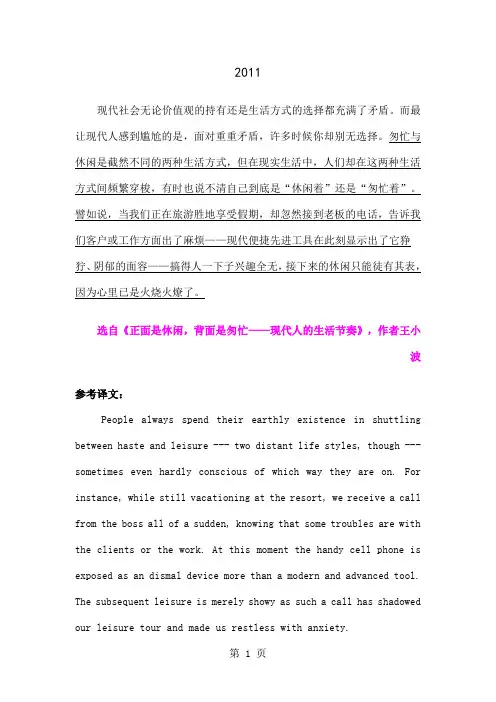
现代社会无论价值观的持有还是生活方式的选择都充满了矛盾。
而最让现代人感到尴尬的是,面对重重矛盾,许多时候你却别无选择。
匆忙与休闲是截然不同的两种生活方式,但在现实生活中,人们却在这两种生活方式间频繁穿梭,有时也说不清自己到底是“休闲着”还是“匆忙着”。
譬如说,当我们正在旅游胜地享受假期,却忽然接到老板的电话,告诉我们客户或工作方面出了麻烦——现代便捷先进工具在此刻显示出了它狰狞、阴郁的面容——搞得人一下子兴趣全无,接下来的休闲只能徒有其表,因为心里已是火烧火燎了。
选自《正面是休闲,背面是匆忙——现代人的生活节奏》,作者王小波参考译文:People always spend their earthly existence in shuttling between haste and leisure --- two distant life styles, though --- sometimes even hardly conscious of which way they are on. For instance, while still vacationing at the resort, we receive a call from the boss all of a sudden, knowing that some troubles are with the clients or the work. At this moment the handy cell phone is exposed as an dismal device more than a modern and advanced tool. The subsequent leisure is merely showy as such a call has shadowed our leisure tour and made us restless with anxiety.朋友关系的存续是以相互尊重为前提的, 容不得半点强求、干涉和控制。
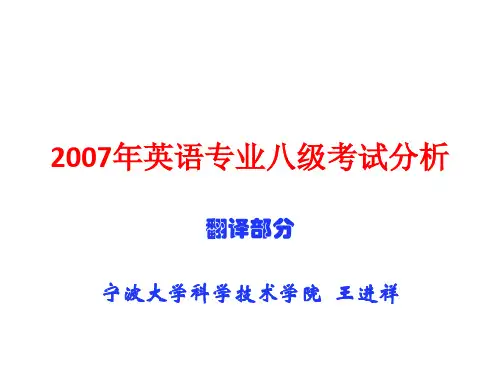
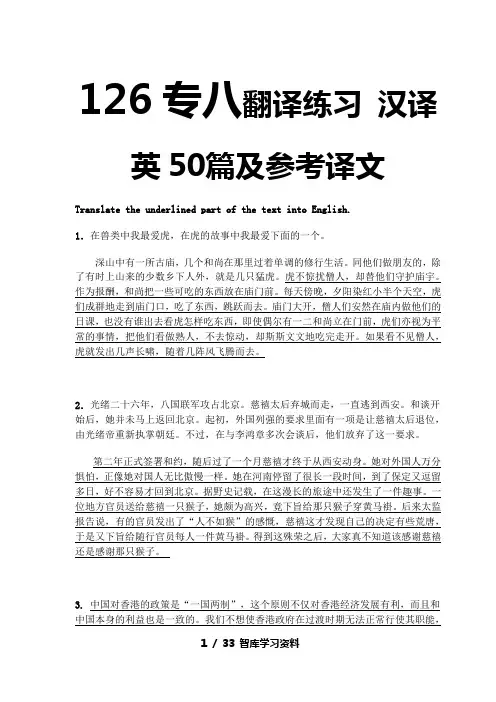
126专八翻译练习汉译英50篇及参考译文Translate the underlined part of the text into English.1.在兽类中我最爱虎,在虎的故事中我最爱下面的一个。
深山中有一所古庙,几个和尚在那里过着单调的修行生活。
同他们做朋友的,除了有时上山来的少数乡下人外,就是几只猛虎。
虎不惊扰僧人,却替他们守护庙宇。
作为报酬,和尚把一些可吃的东西放在庙门前。
每天傍晚,夕阳染红小半个天空,虎们成群地走到庙门口,吃了东西,跳跃而去。
庙门大开,僧人们安然在庙内做他们的日课,也没有谁出去看虎怎样吃东西,即使偶尔有一二和尚立在门前,虎们亦视为平常的事情,把他们看做熟人,不去惊动,却斯斯文文地吃完走开。
如果看不见僧人,虎就发出几声长啸,随着几阵风飞腾而去。
2.光绪二十六年,八国联军攻占北京。
慈禧太后弃城而走,一直逃到西安。
和谈开始后,她并未马上返回北京。
起初,外国列强的要求里面有一项是让慈禧太后退位,由光绪帝重新执掌朝廷。
不过,在与李鸿章多次会谈后,他们放弃了这一要求。
第二年正式签署和约,随后过了一个月慈禧才终于从西安动身。
她对外国人万分惧怕,正像她对国人无比傲慢一样。
她在河南停留了很长一段时间,到了保定又逗留多日,好不容易才回到北京。
据野史记载,在这漫长的旅途中还发生了一件趣事。
一位地方官员送给慈禧一只猴子,她颇为高兴,竟下旨给那只猴子穿黄马褂。
后来太监报告说,有的官员发出了“人不如猴”的感慨,慈禧这才发现自己的决定有些荒唐,于是又下旨给随行官员每人一件黄马褂。
得到这殊荣之后,大家真不知道该感谢慈禧还是感谢那只猴子。
3. 中国对香港的政策是“一国两制”,这个原则不仅对香港经济发展有利,而且和中国本身的利益也是一致的。
我们不想使香港政府在过渡时期无法正常行使其职能,恰恰相反,我们希望它能有效地管理香港的事务,中英联合声明和建造新机场的谅解备忘录就是最好的保证。
至于1997年以后的,全国人民大会已通过了《中华人民共和国香港特别行政区基本法》。
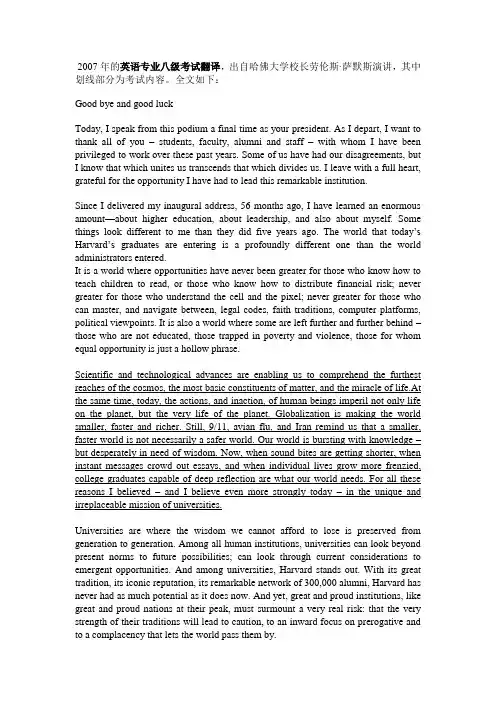
2007年的英语专业八级考试翻译,出自哈佛大学校长劳伦斯·萨默斯演讲,其中划线部分为考试内容。
全文如下:Good bye and good luckToday, I speak from this podium a final time as your president. As I depart, I want to thank all of you –students, faculty, alumni and staff –with whom I have been privileged to work over these past years. Some of us have had our disagreements, but I know that which unites us transcends that which divides us. I leave with a full heart, grateful for the opportunity I have had to lead this remarkable institution.Since I delivered my inaugural address, 56 months ago, I have learned an enormous amount—about higher education, about leadership, and also about myself. Some things look different to me than they did five years ago. The world that today’s Harvard’s graduates are entering is a profoundly different one than the world administrators entered.It is a world where opportunities have never been greater for those who know how to teach children to read, or those who know how to distribute financial risk; never greater for those who understand the cell and the pixel; never greater for those who can master, and navigate between, legal codes, faith traditions, computer platforms, political viewpoints. It is also a world where some are left further and further behind –those who are not educated, those trapped in poverty and violence, those for whom equal opportunity is just a hollow phrase.Scientific and technological advances are enabling us to comprehend the furthest reaches of the cosmos, the most basic constituents of matter, and the miracle of life.At the same time, today, the actions, and inaction, of human beings imperil not only life on the planet, but the very life of the planet. Globalization is making the world smaller, faster and richer. Still, 9/11, avian flu, and Iran remind us that a smaller, faster world is not necessarily a safer world. Our world is bursting with knowledge –but desperately in need of wisdom. Now, when sound bites are getting shorter, when instant messages crowd out essays, and when individual lives grow more frenzied, college graduates capable of deep reflection are what our world needs. For all these reasons I believed –and I believe even more strongly today –in the unique and irreplaceable mission of universities.Universities are where the wisdom we cannot afford to lose is preserved from generation to generation. Among all human institutions, universities can look beyond present norms to future possibilities; can look through current considerations to emergent opportunities. And among universities, Harvard stands out. With its great tradition, its iconic reputation, its remarkable network of 300,000 alumni, Harvard has never had as much potential as it does now. And yet, great and proud institutions, like great and proud nations at their peak, must surmount a very real risk: that the very strength of their traditions will lead to caution, to an inward focus on prerogative and to a complacency that lets the world pass them by.And so I say to you that our University today is at an inflection point in its history. At such a moment, there is temptation to elevate comfort and consensus over progress and clear direction, but this would be a mistake. The University’s matchless resources - human, physical, financial - demand that we seize this moment with vision and boldness. To do otherwise would be a lost opportunity. We can spur great deeds that history will mark decades and even centuries from now. If Harvard can find the courage to change itself, it can change the world.今天,我将以校长的身份,最后一次在这个讲台上演讲。

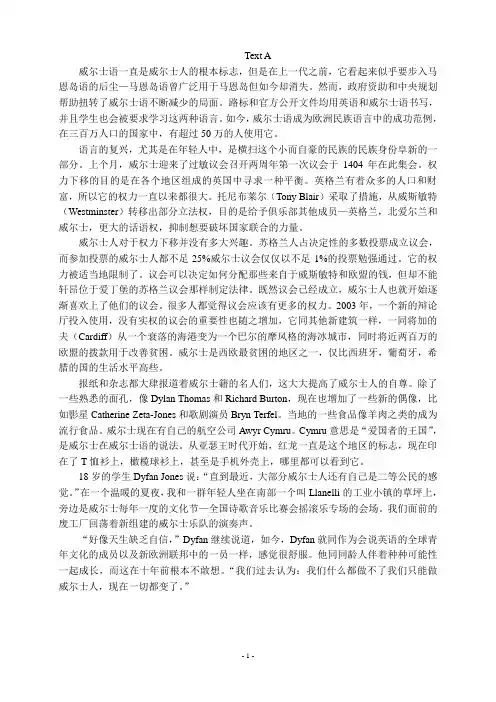
威尔士语一直是威尔士人的根本标志,但是在上一代之前,它看起来似乎要步入马恩岛语的后尘—马恩岛语曾广泛用于马恩岛但如今却消失。
然而,政府资助和中央规划帮助扭转了威尔士语不断减少的局面。
路标和官方公开文件均用英语和威尔士语书写,并且学生也会被要求学习这两种语言。
如今,威尔士语成为欧洲民族语言中的成功范例,在三百万人口的国家中,有超过50万的人使用它。
语言的复兴,尤其是在年轻人中,是横扫这个小而自豪的民族的民族身份阜新的一部分。
上个月,威尔士迎来了过敏议会召开两周年第一次议会于1404年在此集会。
权力下移的目的是在各个地区组成的英国中寻求一种平衡。
英格兰有着众多的人口和财富,所以它的权力一直以来都很大。
托尼布莱尔(Tony Blair)采取了措施,从威斯敏特(Westminster)转移出部分立法权,目的是给予俱乐部其他成员—英格兰,北爱尔兰和威尔士,更大的话语权,抑制想要破坏国家联合的力量。
威尔士人对于权力下移并没有多大兴趣。
苏格兰人占决定性的多数投票成立议会,而参加投票的威尔士人都不足25%威尔士议会仅仅以不足1%的投票勉强通过。
它的权力被适当地限制了。
议会可以决定如何分配那些来自于威斯敏特和欧盟的钱,但却不能轩昂位于爱丁堡的苏格兰议会那样制定法律。
既然议会已经成立,威尔士人也就开始逐渐喜欢上了他们的议会。
很多人都觉得议会应该有更多的权力。
2003年,一个新的辩论厅投入使用,没有实权的议会的重要性也随之增加,它同其他新建筑一样,一同将加的夫(Cardiff)从一个衰落的海港变为一个巴尔的摩风格的海冰城市,同时将近两百万的欧盟的拨款用于改善贫困。
威尔士是西欧最贫困的地区之一,仅比西班牙,葡萄牙,希腊的国的生活水平高些。
报纸和杂志都大肆报道着威尔士籍的名人们,这大大提高了威尔士人的自尊。
除了一些熟悉的面孔,像Dylan Thomas和Richard Burton,现在也增加了一些新的偶像,比如影星Catherine Zeta-Jones和歌剧演员Bryn Terfel。
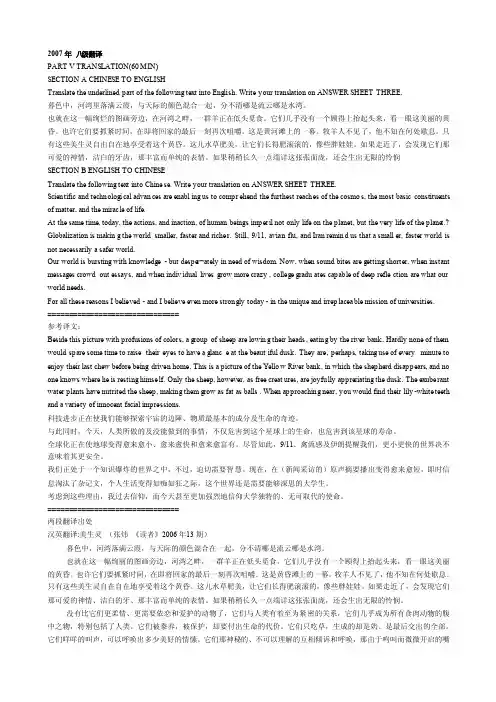
2007年八级翻译PART V TRANSL ATION(60 MIN)SECTIO N A CHINES E TO ENGLIS HTransl ate the underl inedpart of the follow ing text into Englis h. Writeyour transl ation on ANSWER SHEETTHREE.暮色中,河湾里落满云霞,与天际的颜色混合一起,分不清哪是流云哪是水湾。
也就在这一幅绚烂的图画旁边,在河湾之畔,一群羊正在低头觅食。
它们几乎没有一个顾得上抬起头来,看一眼这美丽的黄昏。
也许它们要抓紧时间,在即将回家的最后一刻再次咀嚼。
这是黄河滩上的一幕。
牧羊人不见了,他不知在何处歇息。
只有这些美生灵自由自在地享受着这个黄昏。
这儿水草肥美,让它们长得肥滚滚的,像些胖娃娃。
如果走近了,会发现它们那可爱的神情,洁白的牙齿,那丰富而单纯的表情。
如果稍稍长久一点端详这张张面庞,还会生出无限的怜悯SECTIO N B ENGLIS H TO CHINES ETransl ate the follow ing text into Chines e. Writeyour transl ation on ANSWER SHEETTHREE.Scient ificand techno logic al advanc es are enabli ng us to compre hendthe furthe st reache s of the cosmos, the most basicconsti tuent s of matter, and the miracl e of life.At the same time, today, the action s, and inacti on, of humanbeings imperi l not only life on the planet, but the very life of the planet.? Global izati on is making the worldsmalle r, faster and richer. Still, 9/11, avianflu, and Iran remind us that a smalle r, faster worldis not necess arily a saferworld.Our worldis bursti ng with knowle dge - but desper¬atelyin need of wisdom. Now, when soundbitesare gettin g shorte r, when instan t messag es crowdout essays, and when indivi duallivesgrow more crazy, colleg e gradua tes capabl e of deep reflec tionare what our worldneeds.For all thesereason s I believ ed - and I believ e even more strong ly today- in the unique and irrepl aceab le missio n of univer sitie s.===============================参考译文:Beside this pictur e with profus ionsof colors, a groupof sheepare lowing theirheads, eating by the riverbank. Hardly none of them wouldsparesome time to raisetheireyes to have a glance at the beauti ful dusk. They are, perhap s, taking use of everyminute to enjoytheirlast chew before beingdriven home. This is a pictur e of the Yellow Riverbank, in whichthe shephe rd disapp ears, and no one knowswherehe is restin g himsel f. Only the sheep, howeve r, as free creatu res, are joyful ly apprec iatin g the dusk. The exuber ant waterplants have nutrit ed the sheep, making them grow as fat as balls. When approa ching near, you wouldfind theirlily-whiteteethand a variet y of innoce nt facial impres sions.科技进步正在使我们能够探索宇宙的边陲、物质最基本的成分及生命的奇迹。
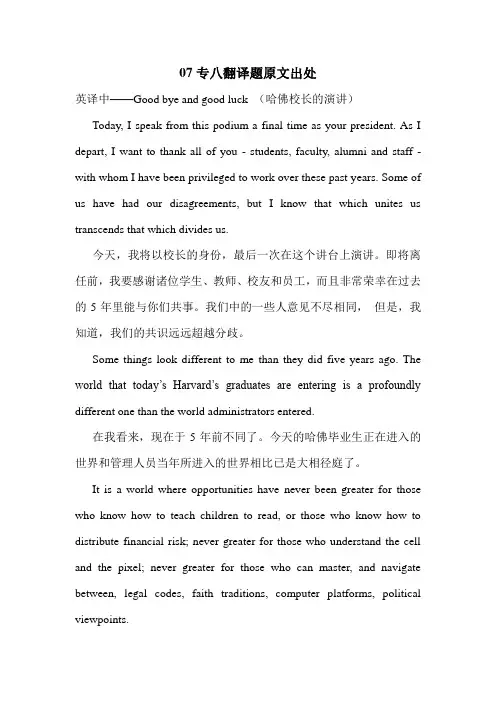
07专八翻译题原文出处英译中——Good bye and good luck (哈佛校长的演讲)Today, I speak from this podium a final time as your president. As I depart, I want to thank all of you - students, faculty, alumni and staff - with whom I have been privileged to work over these past years. Some of us have had our disagreements, but I know that which unites us transcends that which divides us.今天,我将以校长的身份,最后一次在这个讲台上演讲。
即将离任前,我要感谢诸位学生、教师、校友和员工,而且非常荣幸在过去的5年里能与你们共事。
我们中的一些人意见不尽相同,但是,我知道,我们的共识远远超越分歧。
Some things look different to me than they did five years ago. The world that today’s Harvard’s graduates are entering is a profoundly different one than the world administrators entered.在我看来,现在于5年前不同了。
今天的哈佛毕业生正在进入的世界和管理人员当年所进入的世界相比已是大相径庭了。
It is a world where opportunities have never been greater for those who know how to teach children to read, or those who know how to distribute financial risk; never greater for those who understand the cell and the pixel; never greater for those who can master, and navigate between, legal codes, faith traditions, computer platforms, political viewpoints.现今世界,机遇对于这些人来说是空前的:他们知道如何教子女阅读;他们知道如何组合投资;他们懂得「计算机科学」基本存储单元和像素概念;他们能掌握各种法典、传统信仰、计算机平台、政治观点并在其中游刃有余。
2011现代社会无论价值观的持有还是生活方式的选择都充满了矛盾。
而最让现代人感到尴尬的是,面对重重矛盾,许多时候你却别无选择。
匆忙与休闲是截然不同的两种生活方式,但在现实生活中,人们却在这两种生活方式间频繁穿梭,有时也说不清自己到底是“休闲着”还是“匆忙着”。
譬如说,当我们正在旅游胜地享受假期,却忽然接到老板的电话,告诉我们客户或工作方面出了麻烦——现代便捷先进工具在此刻显示出了它狰狞、阴郁的面容——搞得人一下子兴趣全无,接下来的休闲只能徒有其表,因为心里已是火烧火燎了。
选自《正面是休闲,背面是匆忙——现代人的生活节奏》,作者王小波参考译文:People always spend their earthly existence in shuttling between haste and leisure --- two distant life styles, though --- sometimes even hardly conscious of which way they are on. For instance, while still vacationing at the resort, we receive a call from the boss all of a sudden, knowing that some troubles are with the clients or the work. At this moment the handy cell phone is exposed as an dismal device more than a modern and advanced tool. The subsequent leisure is merely showy as such a call has shadowed our leisure tour and made us restless with anxiety.2010朋友关系的存续是以相互尊重为前提的, 容不得半点强求、干涉和控制。
2007年英语专业八级真题答案PART I LISTENING COMPREHENSIONSECTION A MINI-LECTUREIn this section you will hear a mini-lecture. Y ou will hear the lecture ONCE ONL Y. while listening, take notes on the important points. Y our notes will not be marked, but yon will need them to complete a gap-filling task after the mini-lecture. when the lecture is over, yon will be given two minutes to check your notes, and another ten minutes to complete the gap-filling task on ANSWER SHEET ONE. Use the blank sheet for note-taking.题1 - 10[原文]Good morning, today's lecture, is the very first of a series of lectures on art history, so I'd like to spend some time discussing with you the following topic: Why do we need to study art history? And what can we learn from it?First of all, I'd say, if you study art history, this might be a good way to learn more about a culture, than it's possible to learn in general history classes. Y ou know, most typical history courses concentrate on politics, economics and war, but art history focuses on much more than this. Because art reflects not only the political values of a people, but also their religious beliefs, emotions etc. In addition, information about the daily activities of our ancestors can be provided by art, like what people did for a living, what kind of dress they wore, what ceremonies they held etc. In short, art can express the essential qualities of a time and a place, and the study of it clearly offers us a deeper understanding than can be found in most history books and enables us to learn more things about human society and civilization.The second point I'd like to make is about the type of information. In history books, information is objective, that is facts about political economic life of a country are given, b ut opinions are not expressed. Art, on the other hand, is subjective. It reflects personal emotions and opinions. For example, Francisco Goya was a great Spanish painter and also perhaps the first truly political artist. In his famous painting, The Third of May 1808, he showed soldiers shooting a group of simple people. His description of soldiers and their victims has become a symbol of the enormous power or the misuse of this power that the government can have over its people. Over 100 years later, on another continent, the powerful paintings of Mexican artists depicted their deep anger and sadness about social problems. In summary, through art you can find a personal and emotional view of history.Thirdly, art can reflect a culture's religious beliefs. For hundreds of years in Europe, religious art was almost the only type of art that existed. Churches and other religious buildings were filled with paintings that showed people and stories from the Bible. By contrast, one of the main characteristics of art in the Middle East was (and still is), its absence of human and animal images. This reflects the Islamic belief that these images are unholy. Thus, on palaces, mosques and other buildings, Islamic artists have created unique decoration of great beauty with images of flowers of geometric forms, for example, circles, squares and triangles. The same is true of other places, like Africa and Pacific Islands. Art also reflects the religious beliefs of traditional cultures in these places. As a matter of fact, religion is the purpose for this art and it's, therefore, absolutely essential to it. Traditional art in Africa and Pacific Islands is different from Christian art. Christian art influences people's religious feelings towards God. But the goal of traditio nal art in Africa andvillage there had special ceremonies with songs and dances to make sure that crops, animals and people are healthy and increasing in number. The dancers in the ceremonies wear masks, head dresses and costumes that they believe are necessary to influence gods. SO these masks, head dresses themselves, are revelry part of the art.As we said, art depends on culture, different forms of art result from different cultures. Similarly, the way that people view art also depends on their cultural background. This is my fourth point. For most Europeans and Americans, art is mainly for decoration. It is something on a museum wall or in a glass case. It makes their homes more attractive. People look at it and admire it: "Oh, what a beautiful painting!" Besides, ideas are expressed in this art. This is a wonderful statue, and admiring it, 1 might say: "It makes such a strong antiwar statement." But in other places, art is not considered to be separated from everyday existence. It has a function, it has a practical role to play in people's lives. A person in a tribal society might look at a mask and say: "Oh, this is a good mask. It would keep my house safe." In brief, the way in which people enjoy or appreciate art depends on their culture.To conclude my lecture, we can say that art is a reflection of various cultures. But at the same time, we have to remember that art also reflects the changes in society that take place when different cultures influence one another. As people from tribal societies move to urban areas, their values and beliefs change accordingly and their traditional art forms begin to lose their function. At the same time, urban artists begin to learn a lot from traditional art. For example, African masks and figures had a great influence on Picasso's works. And many American and Canadian artists study the simplicity of Japanese painting. The result is that as the world gets smaller, the art of each culture becomes more international.OK, this brings us to the end of our lecture. I hope that after today's lecture, you'll understand better the significance of the study of art history. Art enables us to know more about huma n history, for example, people's views and opinions about certain historical events, and what's more important, about different cultures, their religious beliefs, perception of art etc.What Can We Learn from Art?Ⅰ.IntroductionA. Differences between general history and art history--Focus :--general history: (1)--art history: political values, emotions, everyday life, etc.B. Significance of studyMore information and better understanding of human society and civilization.Ⅱ.Types of informationA. Information in hi story book is (2)--facts, but no opinionsB. Information in art history is subjective-- (3) and opinionse.g.--Spanish painters' works: misuse of governmental power--Mexican artists' works: attitudes towards social problemsⅢ.Art as a reflection of religious beliefsA. Europe: (4) in pictures in churchesB. Middle East: pictures of flowers and patterns in mosques, palacesReason: human and (5) are not seen as holyceremoniesPurpose: to seek the help of (6) to protect crops, animals and people Ⅳ. Perceptions of ArtHow people see art is related to their cultural backgroundA. Europeans and Americans-- (7)--expression of ideasB. People in other places--part of everyday life-- (8) useⅤ. Art as a reflection of social changesA. Cause of changes: (9) of different culturesB. Changes--tribal people: effects of (10) on art forms--European artists: influence of African traditional art in their works--American and Canadian artists: study of Japanese painting1.economics and war2.objective3.personal emotions4.the Bible5.animal images6.the God7.decoration8.practical9. influence; interaction 10.urbanizationSECTION BIn this section you will hear everything ONCE ONLY. Listen carefully and then answer the questions that follow. Mark the correct answer to each question on your ANSWER SHEET.题11 - 15[原文]W: Nigel Linge is editor of Business Travel Weekly. Nigel, thanks for being on the show. Now, what kind of problems do airline passengers face nowadays?M: Well, most of the problems are caused by the heavy volume of traffic. Y ou know, all airports have a limit to the number of take-offs and landings they can handle.W: So what seems to be the problem?M: All flights from a busy airport arrive and leave at more or less the same time. If 60 aircraft are scheduled to take off between 5 p.m. and 5:15, and the airport can only handle 120 an hour, that means some will always be late landing or taking-off. And if the weather is bad, oh, you can imagine what the situation is like. So passengers have to be loaded into each plane, and then the planes have to line up to take off.W: So waiting at the lounge or on the plane is quite common.M: Certainly. And another problem that's very common is over-booking. Quite often you hear an announcement on the airport loudspeakers: "We have over sold on this flight and would like volunteers to go on the next flight out. " If you decide to volunteer, you may get a cash bribe or free-trip voucher, but make sure you get a guaranteed seat on the next flight and a free phone call to whoever is meeting you on the other end. And worse still, you arrive with confirmed reservation and you discover you've been bumped off the flight.W: Presumably, if you choose to travel at off-peak times, there are few problems.M: Well, there are no off-peak times, All flights seem to be full except Saturday. I don't quitebusy. The special fare systems on the airline's computers encourage more people to fly on less popular flights and this means that as a result all flights are equally full.W: So, what advice would you give to business travelers?M: rd say "Avoid big airports if you can". The reason is there are too many flights there. Then, remember not to check your baggage if you can help it. Another thing is "Be prepared for delays". Take something to eat and drink in your hand luggage.W: Nigel, what kind of mistakes do inexperienced travelers make?M: The first mistake business travelers make is to take far too much luggage. Re member, take only carry-on luggage, because at most airports, you can get away with two small bags.W: Oh, I see.M: Another mistake people make is to think that you have to pay full price for air tickets. Y ou should find out about the different ticket options. For example, an RTW fare can save up to 40% on normal fare.W: Excuse me, what is RTW?M: Round the World. For example, if you're going to Australia from the USA, you could go out via Singapore, and come back via North America. And another way to save money is to see if the ticket to a destination beyond it's cheaper. For example, a ticket from Amsterdam from London to New Y ork may be cheaper than one straight from London to New Y ork.W: Oh, that's very useful information.M: And another mistake is to go away for too long. Most people's efficiency and energy start to fall off after two weeks away. So my advice is "Keep your trip short", only go for two weeks and never for a longer than three. Another point is "Don't expect everything to go according to plan". Y ou need to learn to expect the unexpected. There may be a typhoon in summer or your taxi may break down on the way to the airport. In other words, don't be optimistic about plans and don't schedule important meetings too closely together. Y ou need to allow time for delays and break-downs.W: Y eah, this is something travelers have to remember when they plan their trips.M: And another thing, get to know a good travel agent and make sure he gives you the best possible service. Take discounts for example, a good travel agent can get first-class ticket for the price of business-class. This is because he does enough volume of business and he can get discounts with airlines on his own behalf. He should pass them on to you. So make sure he indeed does.W: I think the worst part of a trip is having to travel overnight or being stuck for a weekend in some dreadful place. Are there any ways avoiding that?M: Yes. We can break or stop over in a more relaxing or lively place. It's often available at special cheap weekend rate. V arious airlines and hotel chains offer these. And it's always more pleasant to stay a night in a hotel than on a plane even if you travel business-class.W: Y es. OK, thank you, Nigel, for all the useful information and advice.M: Pleasure!11.According to Nigel, most problems of air travel are caused by ________.[A] Unfavorable weather conditions. [B] Airports handling capacity. [C] Inadequate ticketing service. [D] Overbooking.[参考答案] B12.[A] Free ticket. [B] Free phone call [C] Cash reward [D] Seat reservation[参考答案] C13.Why does Nigel suggest that business travelers avoid big airports?[A] Because all flights in and out of there are full. [B] Because the volume of traffic is heavy.[C] Because there are more popular flights. [D] Because there are more delays and cancellations. [参考答案] B14.According to Nigel, inexperience travelers are likely to make the following mistakes except ________.[A] Booking on less popular flights. [B] buying tickets at full price. [C] carrying excessive luggage. [D] planning long business trips.[参考答案] D15.Which of the following statements is INCORRECT?[A] The possibility of discounts depends on a travel agent's volume of business. [B] Longer flights to the same destination maybe cheaper. [C] It is advisable to plan every detail of a trip in advance. [D] Arranging for stopovers can avoid overnight travel.[参考答案] CSECTION CIn this section you will hear everything ONCE ONLY. Listen carefully and then answer the questions that follow. Mark the correct answer to each question on your ANSWER SHEET.题16[原文]The death toll rose to 74 on Tuesday in Japan's deadliest rail crash in decades as crews pulled more victims from the wreckage. Investigators focused on whether excessive speed or the driver's inexperience had caused the train to derail and slam into an apartment building. The 7-car commuter train carrying 580 passengers left the rails Monday morning in Amagasaki, a suburb of Osaka, about 250 miles west of Tokyo, it injured more than 440 people.16.what happened on Monday?[A] A train crash occurred causing minor injuries. [B] Investigator found out the cause of the accident. [C] Crews rescued more passengers from the site. [D] A commuter train crashed into a[参考答案] D[原文]20 of the world's top economies promised to help Iraq lower its debt and to help restart global trade talks after a 2-day meeting in Mexico on Monday. Officials from the group of 20, G20 Nations, also discussed the possibility of sanctioning countries that refused to cooperate in the fight against terrorism. Possible sanctions were not outlined at the meeting. In a declaration released at the end of the meeting, ministers called on World Trade Organization, WTO members, to restart the trade talks that collapsed in Kankoon last month. Nations must quickly reenergize the negotiation process, recognizing that flexibility and political will from all are urgently needed, it said. G20 ministers also talked about the possibility of creating a V oluntary Code of Conduct to govern negotiations between creditors and countries on the verge of defaulting on debt. The code would outline the steps that should be taken to prevent a financial crisis. Created in 1999 to avoid financial disasters and to keep the global economy stable, the G20 is made up of the European Union and 19 other countries including Australia, Brazil, China, Japan and the US.17.Which of the following was not on the agenda of the G20 meeting?[A] Iraq debts [B] WTO talks [C] Financial disasters [D] Possible sanctions[参考答案] C18.The G20 is a(n)________ organization.[A] International [B] European [C] Regional [D] Asian[参考答案] A题19 - 20[原文]The United Nations celebrated the 60th anniversary of its Charter on Monday, the speakers addressing the UN General Assembly. UN Secretary General Kofi Annan said the UN had both successes and failures in carrying out the pledges in the Charter. The UN Charter is the constitution of the organization. It was signed in San Francisco on June 26th, 1945 by the 50 original member countries. It took effect on October 24th, 1945 after being improved by the 5 founding members: China, France, the Soviet Union, the United Kingdom and the United States and the majority of the other countries that signed the Charter. The Charter is a constitution on trading or countries that signed it are bound by its articles. It states that the Charter comes first above all other treaties. Its main purposes include the prevention of new conflict, building peace and protecting human rights and social progress. The most important chapters are these dealing with enforce ment powers of UN bodies. They describe, for example, the Security Council's power to investigate and mediate disputes. They also describe its power to authorize economic, diplomatic and military sanctions asoverhaul the organization, including the Security Council. This could be the most comprehensive UN reform since its foundation。
TEM-8 翻译部分英语专业八级翻译真题(1998年——2007年)第一部分汉译英Passag e 1.( 1998年)1997年2月24日我们代表下榻日月潭中信大饭店,送走了最后一批客人,已是次日凌晨3点了。
我躺在床上久久不能入睡,披衣走到窗前,往外看去,只见四周群峦叠翠,湖面波光粼粼。
望着台湾这仅有的景色如画的天然湖泊,我想了许多,许多……这次到台湾访问交流,虽然行程匆匆,但是,看了不少地方,访了旧友,交了新知,大家走到一起,谈论的一个重要话题就是中华民族在21世纪的强盛。
虽然祖国大陆、台湾的青年生活在不同的社会环境中,有着各自不同的生活经历,但大家的内心都深国统一大业的早日完成。
世纪之交的宝贵机遇和巨大挑战把青年推到了历史的前台。
跨世纪青年一代应该用什么样的姿态迎接充满希望的新世纪,这是我们必须回答的问题。
日月潭水波不兴,仿佛与我一同在思索……Passag e 2.( 1999年)加拿大的温哥华1986年刚刚度过百岁生日,但城市的发展令世界瞩目。
以港立市,以港兴市,是许多港口城市生存发展的道路。
经过百年开发建设,有着天然不冻良港的温哥华,成为举世闻名的港口城市,同亚洲、大洋洲、欧洲、拉丁美洲均有定期班轮,年货物吞吐量达到8,000万吨,全市就业人口中有三分之一从事贸易与运输行业。
温哥华(Vancou ver)的辉煌是温哥华人智慧和勤奋的结晶,其中包括多民族的贡献。
加拿大地广人稀,国土面积比中国还大,人口却不足3000万。
吸收外来移民,是加拿大长期奉行的国策。
可以说,加拿大除了印第安人外,无一不是外来移民,不同的只是时间长短而已。
温哥华则更是世界上屈指可数的多民族城市。
现今180万温哥华居民中,有一半不是在本地出生的,每4个居民中就有一个是亚洲人。